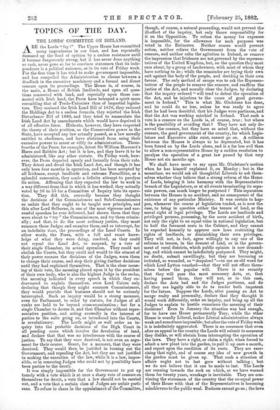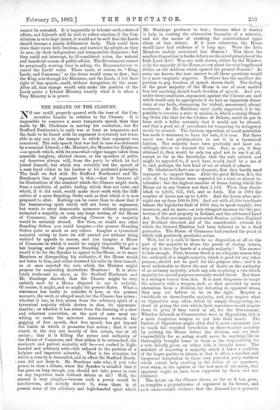TOPICS OF THE DAY.
THE LORDS' COMMITTEE ON IRELAND.
ARE the Lords " fey ?" The Upper House has committed many imprudences in our time, and has repeatedly dammed up the flood of opinion by a useless resistance until it became dangerously strong, but it has never done anything so rash, never gone so far to convince statesmen that its inde- pendence is a political nuisance, as in its vote of Friday week. For the first time it has tried to make government impossible, and has compelled the Administration to choose between a deadlock in the executive machinery and a formal and direct censure upon its proceedings. The House is, of course, in the main, a House of British lb.ndlords, and upon all ques- tions connected with land, and especially upon those con- nected with Irish land, the Peers have betrayed a spirit more resembling that of Trade-Unionists than of impartial legisla- tors. They maimed the Irish Land Bill of 1870, they reduced the Holdings Act to a useless formula, they rejected the Irish Disturbance Bill of 1880, and they tried to emasculate the Irish Land Act by amendments which would have deprived it of all effective force. Hitherto, however, they have respected the theory of their position, as the Conservative power in the State, have accepted any law actually passed, as a law morally entitled to obedience, and have abstained from using their excessive powers to arrest or vilify its administration. Three- fourths of the Peers, for example, detest Sir William Harcourt's Hares and Rabbits Act ; but it is law, and they leave it to be administered, like any other statute. On Friday week, how- ever, the Peers departed openly and formally from their rule. They detest and dread the Irish Land Act, and though it has only been four months in operation, and has been accepted by all Irishmen, except landlords and extreme Parnellites, as a splendid concession, they made a definite attempt to paralyse its action. Affirming that they expected the law to work in a way different from that in which it has worked, they actually voted by 96 to 53 for a Committee of Inquiry into its opera- tion. They did this, avowedly because they thought the decisions of the Commissioners and Sub-Commissioners so unfair that they ought to be taught new principles, and this after Lord Selborne, in one of the most vigorous and suc- cessful speeches he ever delivered, had shown them that they were about to " try " the Commissioners, and try them crimin- ally; and that, to do the most ordinary justice, they must summon those Judges and examine them, and so interrupt, for an indefinite time, the proceedings of the Land Courts. In other words, the Peers, with a full and exact know- ledge of what they were doing, resolved, as they could not repeal the Land Act, to suspend, by a vote of their single Chamber, its actual operation. They could not abolish the Courts, but they could and would to the utmost of their power censure the decisions of the Judges, warn them to change their course, and stop their giving further decisions until they had explained themselves. That is the clear mean- ing of their vote, the meaning placed upon it by the president of their own body, who is also the highest Judge in the realm, the meaning indicated in every speech in which they en- deavoured to explain themselves, even Lord Cairns only declaring that though they might summon Commissioners, they would provide that business should not be seriously interrupted. Such an inquiry would be a strong measure, even for Parliament, to order by statute, for Judges of all ranks are held to be beyond cross-examination ; but for a single Chamber to decree it, and that Chamber without repre- sentative position, and acting avowedly in the interest of parties to the suits going on, or introduced into the Courts, is revolutionary. The Lords might as well order an in- quiry into the probable decisions of the High Court in all pending cases which involve the devolution of land, and declare that that was no interference with the course of justice. To say that they were deceived, is not even an argu- ment for their course. Grant, for a moment, that they were deceived. They would then be justified in turning out the Government, and repealing the Act, but they are not justified in making the execution of the law, while it is a law, impos- sible, or in censuring Judges who could not by possibility have been parties to the deceit. It was simply impossible for the Government to put up tamely with a vote which is at once a sharp vote of censure on themselves for deceit, a vote that a law should not be carried out, and a vote that a certain class of Judges are unfair parti- sans. To refuse to share in the appointment of the Committee, though, of course, a natural proceeding, would not prevent the ill-effect of the inquiry, but only throw responsibility for it on the Opposition. To refuse the money for expenses. is impossible, for the allowance for such purposes was• voted in the Estimates. Neither course would prevent action, neither relieve the Government from the vote of censure, and neither calm the agitation in Ireland, or remove the impression that Irishmen are not governed by the represen- tatives of the United Kingdom, but, on the question they most care about, by a group of landowners, with most of whom they have nothing to do ; while the remainder are trying their own suit against the body of the people, and deciding in their own favour. The only method of escape was to ask the Represen- tatives of the people to remove the censure, and reaffirm the justice of the Act, and morally clear the Judges, by declaring that the inquiry ordered " will tend to defeat the operation of the Act, and be injurious to the cause of good govern- ment in Ireland." This is what Mr. Gladstone has done, and he could do no less, unless he was ready to agree that he had been deceitful, that his Judges were partisans, and that the Act was working mischief in Ireland. That such a vote is a censure on the Lords is, of course, true ; but where is the possibility of avoiding that ? They have not only de- served the censure, but they have so acted that, without the censure, the good government of the country, for which Legis- lature and Executive alike exist, cannot go on. A collision between the Houses is always to be deprecated, but it has been forced on by the Lords alone, and is a far less evil than to allow a non-representative House by a sudden resolution to paralyse the operation of a great law passed by that very House not six months ago.
We shall have more to say upon Mr. Gladstone's motion when he has himself explained it, on Monday ; but in the meantime, we would ask all thoughtful Liberals to ask them- selves whether they believe that a strong reform of the Hoise of Lords, bringing it into harmony with the Representative branch of the Legislature, or at all events terminating its sepa- rate powers, can much longer be postponed ? This separation. between the Houses is no accident, and no consequence of the existence of any particular Ministry. It was certain to hap- pen, whenever the course pf legislation tended, as is now the case, to bring in question either the tenure of land, or the moral right of legal privilege. The Lords are landlords and privileged persons, possessing, by the mere accident of birth, not only the right to an equal voice in national legislation, but to half the foremost seats in the Cabinet, and they cannot be expected honestly to approve new laws restricting the rights of landlords, or diminishing their own privileges. They will not, in fact, agree willingly to any one of the reforms in tenure, in the descent of land, or in the govern- ment of rural districts, which public opinion is now demand- ing, and which cannot be indefinitely postponed. They might, no doubt, submit unwillingly, but they are becoming so irritated, so wounded, so " despaired "—to use an old word for which Lord Lytton vouched—that they will not efface them- selves before the popular will. There is no security that they will pass the most necessary Acts, or, that having passed them, they will not, as in this case, declare the Acts bad and the Judges partisans, and do all they are legally able to do to render both impotent for the future. Suppose the Lords, after passing an Act to merge realty and personalty, declare that they thought it would work differently, order an inquiry, and bring up all the Judges to explain to hostile examiners the meaning of their decisions! Even in January the situation was bad enough, for to have one House permanently Tory, while the other House is usually Liberal, makes Liberal administration always weak and sometimes impossible ; but after the vote of Friday week it is indefinitely aggravated. There is no assurance that even after an appeal to the country the Lords will submit to measures they dislike, or will abstain from interrupting the operation of the laws. They have a right, or claim a right, when forced to admit a new plant into the garden, to pull it up onee a month, and report upon the condition of its roots. They are exer- cising that right, and of course any idea of new growth in the garden must be given up. That such a situation of affairs ought not to last goes without talking ; but we do not believe that it can be made to last. The Lords are running towards the rock on which, as we have warned them for twenty years, wreckage is inevitable. They are con- vincing the statesmen of the country that the co-equal power of their House with that of the Representatives is becoming mischievous to the public weal. Business cannot go on ; the laws
cannot be executed. It is impossible to tolerate such a state of affairs, and Liberals will do well to reflect whether, if the Con- stitution is to be kept intact, it would not be well that the Lords should become a purely deliberative body. They could then state their views with freedom, and instruct the people, as they do now, by their independent and irresponsible eloquence ; but they could not interrupt, by ill-considered votes, the natural and beneficial course of public affairs. The Government cannot be perpetually wasting time in asking the Representatives to cancel the Lords' votes. There must, of course, be " King, Lords, and Commons," or the rivers would cease to flow ; but the King acts through his Ministers, and the Lords, if left their right of free speech, could, without derogation, do the same. After all, that change would only make the position of the Lords under a Liberal Ministry exactly what it is when a Tory Ministry is in power.



































 Previous page
Previous page